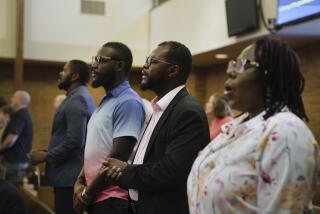Church Pins Its Faith on a Serpent’s Embrace : Religion: ‘They shall take up serpents,’ the Bible says, and snake handlers do just that in a rural West Virginia church. It is an affirmation of their faith.
- Share via
JOLO, W. Va. — “When I die, I wanna snake-bit die.”
Dewey Chafin’s voice is soft as gauze, but the sentiment is hammered iron. You can’t doubt a man’s sincerity when he’s standing at a pulpit holding two squirming rattlesnake.
“Yes, Lord,” answers a parishioner.
“Praise Jesus,” answers another.
This is the Church of the Lord Jesus in Jolo, W. Va., the last state in the union where religious snake handling is legal. The church isn’t affiliated with any Christian denomination. It has no religious statuary, no baptismal fountain, no cross. This is not to suggest it has no religion.
“I’m a snake handler,” says Chafin. His mother beams. She’s here too, holding a hissing rattler.
Chafin is 58, a disabled coal miner and a Korean War vet; like the five dozen other people standing in this rural church, he believes in the New Testament exactly as it was written. And that includes the Book of Mark, Chapter 16, Verse 18, where Jesus says, “They shall take up serpents; and if they drink any deadly thing, it shall not hurt them; they shall lay hands on the sick, and they shall recover.”
Each dance with snakes is a test of faith.
In 35 years of snake handling, Chafin says, he’s been bitten 116 times, on the hands and arms and, recently, on the right eyebrow.
Like other snake handlers, Chafin says he’s never treated a bite with anything other than prayer.
Around him are about 50 members of his church. None drinks, none smokes and all dress neatly. The rules in this church are posted: Neatness is required. Lying is outlawed, along with gossiping and backbiting.
Here is Ray Johnson, who drives 150 miles to the church every weekend from Galax, Va., with his wife, Betty, and their five children. They bunk in a vacant cabin on a nearby mountaintop. Johnson has had two heart attacks. He wears a cap reading “God Said It, I Believe It And That’s It.”
And here is Lydia Hollins, the organist. She is Chafin’s niece, the daughter of Columbia Chafin, who died in 1962, when Lydia was just a girl. She died of a snake bite at the age of 22. She was the church’s only fatality, Chafin says. She was his sister.
The dead woman’s daughter is gently cradling a big-bellied viper in both hands and praising the Lord.
There is fanaticism in this room, and bravery and passion and something moving that is not easily put into words.
Jolo is a tough 30-mile drive north over Bradshaw Mountain from Grundy, Va. It is an area long on coal tradition but short on jobs. The town post office is a faded white trailer. The snake handling church, tucked along a windy road, is an asbestos-gray building with a small gravel parking lot.
The faithful have been arriving since 10 a.m. on this Sunday, and a picnic is getting under way in the parking lot. This is a special weekend, the church’s 28th homecoming.
Nearby, wooden boxes are being taken from pickups. Neatly lettered on the sides: “They Shall Handle Serpents” and “Mark 16:18.”
Joe Short and his son, Verlyn, have driven three hours over the mountains from Mayking, Ky., with a box containing eight “fresh-caught” rattlers and copperheads.
“These ain’t never been handled before,” says Joe, a small, smiling man with slicked-back hair. “It’s gettin’ harder to catch ‘em in my favorite huntin’ spot these days. I think they recognize my footsteps by now and just dig deeper under them rocks when they hear me comin’.”
Snake handlers have been practicing their religion throughout Appalachia since the turn of the century. It’s still going on, usually in defiance of one law or another. Not here.
According to Kenneth Ambrose, a sociologist at Marshall University in Huntington, W. Va., who has studied snake handling, politicians in West Virginia have learned that it is useless to legislate against something people want to do, even for their own good.
“A lot of these people are Scotch Irish, and laws aren’t really going to sway their opinions in regard to their traditions,” Ambrose says.
Bites from North America’s venomous snakes are unpredictable. Even when untreated, they seldom kill healthy adults: On the average, snakebites kill 13 Americans a year. Since 1909, only a dozen or so of those deaths have been traced to religious ceremonies.
Snake handlers believe they survive through the power of their prayer, and they brook no argument on that point.
“You handle snakes enough, you’ll get bit,” Chafin says. “You can go the longest time and nothin’ happens. You think you’re walkin’ the high road and your sinnin’ days are behind you, and then, wham, you get bit. It’s just God’s way of letting you know you are you and the Lord is the Lord.”
Chafin then answers a question that has not been asked.
“Handling snakes . . . is my way of thinkin’ that all the words in the Bible are true or they’re not true. I think they’re true. Now, you don’t pick up a poison snake until you’ve been anointed. That’s when God tells you that you can do it. You’ll know when the time comes and the spirit of the Lord will move you. . . . When we handle snakes . . . we celebrate a victory. The victory is for the Lord, though, not for us.”
In the mid-1960s, during surgery on his ear, Chafin was pronounced dead on the operating table, he says. When he came to, he was like a child--played with his kids’ toys, babbled like a baby. His mother, Barbara, confirms this.
It was his family’s intense praying that brought his mind back, Chafin believes, and now--although he has not been ordained a preacher--he is regarded by some in the area as a holy man. Friends and strangers sometimes arrive in his yard to ask him to pray with them, to lay on hands.
“Some woman from Boaz, Ala., calls me up every Sunday, asks me to pray for her church,” Chafin says.
Inside the church, Bob Elkins, a powerfully built man with glasses, slips the strap of a white electric Fender bass over his head and strums a chord. An impromptu band joins in on piano, organ, guitar and drum, and a throbbing rockabilly version of “Reach Out and Touch the Lord” blasts through the room. When he’s not preaching, Elkins, 64, is a machinist working deep in a coal shaft.
The children are separated in the back of the room. The adults are on their feet and moving. Everyone is dancing--a free-style, spirited, rolling shuffle-stomp. Most everyone is singing.
Snakes are passed from hand to hand, man to woman, woman to man, man to man, gingerly, reverently. One 60-ish woman is performing a pirouette, her snake above her head, curled up fat in a palm.
This is controversial stuff: Some residents don’t mind this church at all. Others do.
“I’ve been pastor of this church since the early ‘50s,” Elkins says. “I’ve been beaten up, shot at and called every name but Mister Elkins.”
This church calls itself Christian, and it teaches turning the other cheek.
When the music stops after maybe a quarter hour of snake-handling, the men and women almost reluctantly place the serpents back in the boxes.
“A lot of people call us a lot of names because of the way we choose to worship the Lord. They think we’re not all there because we handle snakes,” Elkins says at a microphone. “We don’t try to push our religion on anybody.”
“Religious people who believe in the Holy Bible handle snakes thousands of times and don’t die.
“Now, when somebody sits around all day drinkin’ whiskey and gets in his car and wraps it around a telephone pole and kills himself, everybody feels sorry for him and says what a shame it is.
“They say when we get bit we’re just tempting the Lord. Well, it says right in the Bible that the Lord can’t be tempted. It’s in the Book of James. Everything we do and believe is in the Bible. Most folks read the Bible like it was a magazine.”
“Amen, Jesus.”
Then in what amounts to a sermon-ending public service announcement, Elkins announces: “Remember, if you’re under 18, stay out of the boxes.”
More to Read
Sign up for Essential California
The most important California stories and recommendations in your inbox every morning.
You may occasionally receive promotional content from the Los Angeles Times.










